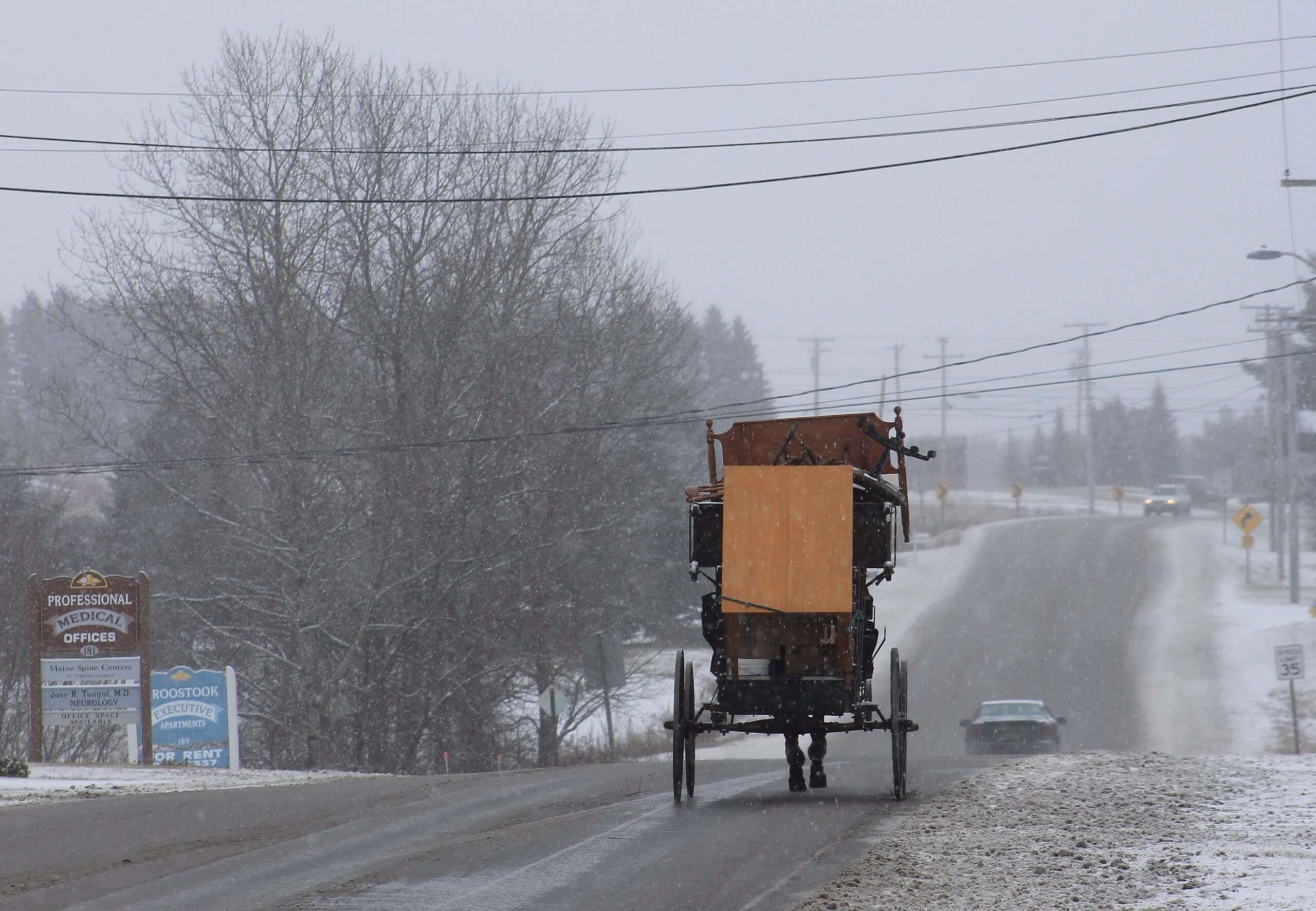
PRESQUE ISLE, Maine — City officials have started a conversation with regional Amish community leaders on ways to address residents’ complaints about horse manure in roadways and public areas.
Over the last several years, a number of residents have called the city to complain about the droppings left by horses hauling Amish buggies to Presque Isle from Easton and Fort Fairfield, City Manager Martin Puckett said during the July 5 City Council meeting.
No other Maine municipalities have set up an ordinance addressing horse manure, but Puckett said that Auburn, Kentucky, enacted one requiring horses within city limits to wear a type of diaper.
In a discussion with several members of the local Amish community, city councillors said they want to find a solution to the issue without necessarily having to create a local regulation.
“We want to start a conversation,” said councillor Craig Green.
Councillor Mike Chasse said he heard a number of complaints about horse manure around Riverside Drive and Riverside Park, including under trees to which horses may be tied.
“Parents have found their kids with horse manure on them,” Chasse said.
Councillor Kevin Freeman said that Presque Isle wants to continue to be welcoming to the Amish, who travel to Presque Isle for business and shopping.
Ten years ago, the first Amish families to come to central Aroostook County and settled in Easton and Fort Fairfield. Amish members now account for almost 15 percent of Easton’s total population of about 1,300, according to the town manager, and Amish settlers have continued to set down roots in other towns, such as Perham.
For a busy service center such as Presque Isle, “we have to be aware of the side effects” of increased Amish horse and buggy traffic, Freeman said. “There’s more and more horses going up and down the streets,” raising safety concerns as well as the issue of manure on the roads, Freeman said.
“I’m sure other communities are going to look at this as well,” he said, adding that the Amish community could develop a voluntary approach to controlling horse manure.
A member of the Amish community who was not identified told the councilors that their members are willing to address the concerns. He said they could locate barrels in which to place the manure at the common areas where horses are stationed throughout the city. But he said that cleaning up every horse dropping from the road or using diapers would be too costly and potentially dangerous.
“You’d have to have a super-safe horse to put that on the back of a horse without them kicking.”
He added that it would be impractical to stop and tie up a horse while travelling.
He also said he thinks some people may be overreacting to horse manure.
“Horse manure is a little bit of grass fiber, and it goes away. It’s not as much of an issue as it looks. There’s a lot of things that are more unhealthy, you just don’t see it.”
Having mounted police and carriage horses in New York City can be messy business, according to the Gotham Gazette.
Carriage horses travel from their stables along city streets to Central Park, where they charge people to ride them around the same park loops over and over, according to the publication. Carriage driver Christina Hansen told the gazette that carriage horses are equipped with diaper bags that are attached to the carriage to catch the horse droppings. The industry also hires sweepers to clean up the loops in Central Park.
Police horses also patrol all over the five boroughs, from busy tourist areas like Times Square or Coney Island to high-crime areas in Brooklyn and the Bronx, according to the gazette. The police horses do not wear diapers.
In Houlton, where Amish members visit from southern Aroostook towns like Smyrna, the issue of horse manure on roadways has not come up in recent years, said Houlton town manager Butch Asselin.
But other towns have received complaints, including in Fort Fairfield.
When the issue of “road apples,” as locals have called them, came up before the Fort Fairfield town council, town manager Jim Risner met with Amish leaders in the fall of 2015.
“The Amish leaders and I agreed that anytime I received a complaint about road apples, I would take a photo and provide that to an Amish leader and discuss the situation with them,” Risner said.
The town along with a number of businesses have installed buckets and shovels for the droppings at hitching posts, and some Amish have tried to limit their horse’s time on Main Street, where many of the complaints about droppings have originated, Risner said.
While it’s not clear if Fort Fairfield’s road apple situation has changed much since 2015, Risner said the town has had good dialogue with the Amish community.
“It’s important to have the communication,” Risner said.







